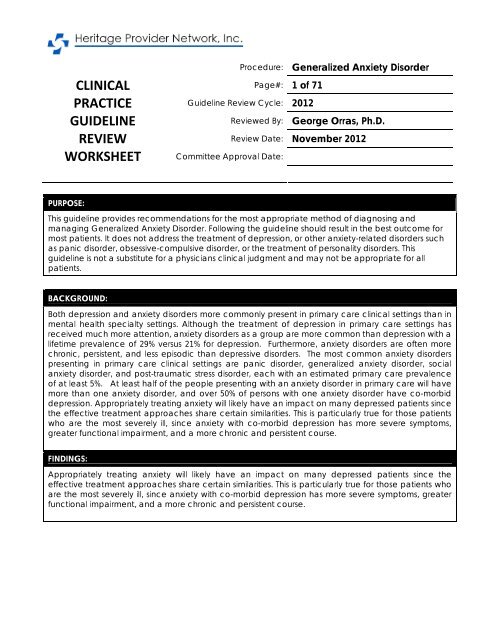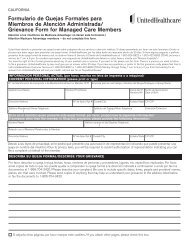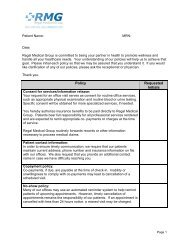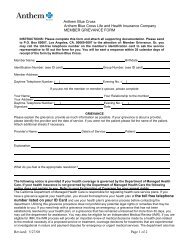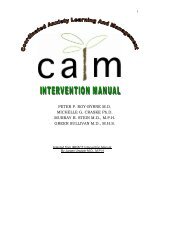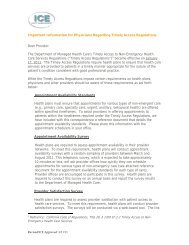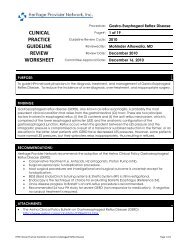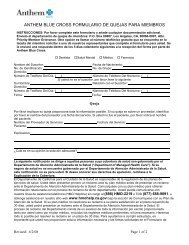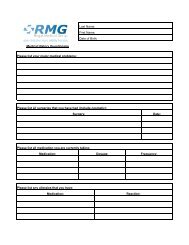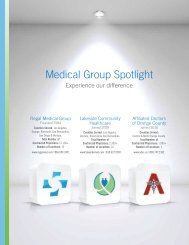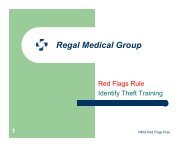Anxiety CPG - Regal Medical Group
Anxiety CPG - Regal Medical Group
Anxiety CPG - Regal Medical Group
You also want an ePaper? Increase the reach of your titles
YUMPU automatically turns print PDFs into web optimized ePapers that Google loves.
CLINICAL<br />
PRACTICE<br />
GUIDELINE<br />
REVIEW<br />
WORKSHEET<br />
Procedure: Generalized <strong>Anxiety</strong> Disorder<br />
Page#: 1 of 71<br />
Guideline Review Cycle: 2012<br />
Reviewed By: George Orras, Ph.D.<br />
Review Date: November 2012<br />
Committee Approval Date:<br />
PURPOSE:<br />
This guideline provides recommendations for the most appropriate method of diagnosing and<br />
managing Generalized <strong>Anxiety</strong> Disorder. Following the guideline should result in the best outcome for<br />
most patients. It does not address the treatment of depression, or other anxiety-related disorders such<br />
as panic disorder, obsessive-compulsive disorder, or the treatment of personality disorders. This<br />
guideline is not a substitute for a physicians clinical judgment and may not be appropriate for all<br />
patients.<br />
BACKGROUND:<br />
Both depression and anxiety disorders more commonly present in primary care clinical settings than in<br />
mental health specialty settings. Although the treatment of depression in primary care settings has<br />
received much more attention, anxiety disorders as a group are more common than depression with a<br />
lifetime prevalence of 29% versus 21% for depression. Furthermore, anxiety disorders are often more<br />
chronic, persistent, and less episodic than depressive disorders. The most common anxiety disorders<br />
presenting in primary care clinical settings are panic disorder, generalized anxiety disorder, social<br />
anxiety disorder, and post-traumatic stress disorder, each with an estimated primary care prevalence<br />
of at least 5%. At least half of the people presenting with an anxiety disorder in primary care will have<br />
more than one anxiety disorder, and over 50% of persons with one anxiety disorder have co-morbid<br />
depression. Appropriately treating anxiety will likely have an impact on many depressed patients since<br />
the effective treatment approaches share certain similarities. This is particularly true for those patients<br />
who are the most severely ill, since anxiety with co-morbid depression has more severe symptoms,<br />
greater functional impairment, and a more chronic and persistent course.<br />
FINDINGS:<br />
Appropriately treating anxiety will likely have an impact on many depressed patients since the<br />
effective treatment approaches share certain similarities. This is particularly true for those patients who<br />
are the most severely ill, since anxiety with co-morbid depression has more severe symptoms, greater<br />
functional impairment, and a more chronic and persistent course.
Recommendation:<br />
<br />
Heritage Provider Network recommends the adoption of the CALM (Coordinated <strong>Anxiety</strong> Learning<br />
and Management interventional manual and the GAD 7 tool for assessing generalized anxiety<br />
SOURCES USED:<br />
1. Windstone Behavioral Health, Inc. http://www.windstonebehavioral.com/<br />
ATTACHMENTS:<br />
1. CALM (Coordinated <strong>Anxiety</strong> Learning and Management interventional manual<br />
2. GAD 7


